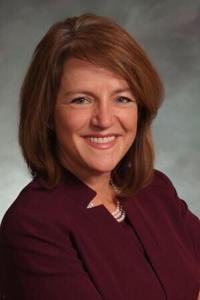Q&A with Shannon Bird and Emily Sirota | House Democrats’ new faces on the Joint Budget Committee
U3RhdGUgbGF3bWFrZXJzIHJldHVybmVkIHRvIHRoZSBDYXBpdG9sIG9uIE1vbmRheSBmb3IgYSBzcGVjaWFsIHNlc3Npb24gdG8gd29yayBvbiBiaWxscyB0aWVkIHRvIENPVklELTE5LiBTdGF0ZSBSZXAuIFNoYW5ub24gQmlyZCwgRGVtb2NyYXQsIGdldHMgcmVhZHkgZm9yIHRoZSBmaXJzdCBkYXkgb2YgdGhlIHNlc3Npb24gYnkgYWRqdXN0aW5nIGhlciBtYXNrIG9uIE1vbmRheSwgTm92LiAzMCwgMjAyMC4=
SkVSSUxFRSBCRU5ORVRULCBUaGUgR2F6ZXR0ZQ==
The powerful Joint Budget Committee is in the midst of its second major change in membership in the last four years.
In the House, Speaker-elect Julie McCluskie of Dillon is leaving the panel after two years; Rep. Kim Ransom, the House Republican representative, is term-limited; Sen. Chris Hansen, D-Denver is running for Denver mayor, as is his JBC colleague, Rep. Leslie Herod, D-Denver.
That left four openings on the committee, the same situation the JBC found itself in after the 2018 elections. The JBC, with its new complement of members, had one “normal” budget year before the state, nation and world were plunged into the COVID-19 pandemic that wreaked havoc on public health and governmental budgets.
Filling those slots, from the House Democratic caucus: Reps. Shannon Bird, D-Westminster and Emily Sirota, D-Denver, who will both begin their third terms in office in January.
Rep. Shannon Bird

Rep. Shannon Bird, D-Westminster
courtesy Colorado General Assembly

Rep. Shannon Bird, D-Westminster
Bird has served as chair of the House Finance Committee for the past two sessions and is the JBC’s vice-chair
She brings to her new role a background in public finance, an attorney who worked on capital infrastructure investment. Her first law practice focused on bond financing for roads and bridges.
Bird served as chair of a 2014 bond campaign for Adams 12 schools and as board chair for the Five Star Education Foundation (which works with Adams County schools). She was a member of the Westminster City Council from 2015 to 2019, which she followed up with her first election to the Colorado House of Representatives for State House District 35.
Colorado Politics: Why the JBC and why now?
Shannon Bird: JBC has been a longstanding interest of mine since I’ve been in the legislature. It’s a competitive role, lots of people seek it. The timing just happened to be right.
The budget is the most interesting part of our work, how the state is poised to deliver solutions for people expecting good, competent government.
JBC is that opportunity to get to a higher level o how the government operates. I know it’s a lot of work, but it’s the right place for me.
CP: What are you passionate about?
SB: My primary interest is K-12 and higher education
CP: How do you balance Rep. Sirota’s views with your own?
SB: I expect Rep. Sirota and I will complement each other. She has strengths in areas that I haven’t done deep dives into. She’s better versed in health care policy. I have a strong background in government capital infrastructure financing.
We’re both lifelong learners and at the end of the day we share values. I have great repsect for Rep. Sirota; she’s thoughtful and just as studious on all these issues as I am.
CP: Where do you see the state budget headed for 2023-24?
SB: I’m pleased to see the governor increase investment in K-12. He has a more narrow focus on where to direct state resources, a view I share. As our economic future is not certain, we need to be thoughtful about how to deploy new resources and how to sustain them in the future. But I’m most concerned about K-12, with teachers leaving the profession and an inability by school districts to pay competitive wages. We can play a key role to make sure sustainable dollars address teacher shortage issues.
CP: How will you guide your caucus members on the realities of the next budget, which the governor has said will have little money for new programs?
SB: I’ll just be straightforward with caucus members from the beginning. We’ll update them on economic forecasts. Voters just voted for a tax cut, and added new responsibilities with Proposition 123 (the affordable housing initiative that will tap about $300 million per year from TABOR refunds). These put new demands on the state budget.
To the extent we invest in different programs, we undercut the state’s ability to invest in responsibilities like K-12 education or maintaining capital infrastructure, such as roads and bridges, which are the foundation to the future. People are still driving cars; we suffer when basic infrastructure isn’t maintained. We also need to bring down the cost of higher ed; we’ve made it unaffordable.
CP: How will you maintain a work-life balance, being on the busiest committee in the legislature?
SB: I am forever a problem solver and will figure that out.
Rep. Emily Sirota

Rep. Emily Sirota, D-Denver
courtesy Colorado General Assembly

Rep. Emily Sirota, D-Denver
Sirota’s path to the General Assembly came through what’s almost unthinkable: she was one of two Democrats who challenged an incumbent Democrat, Rep. Paul Rosenthal, for House District 9. Rosenthal failed to make the primary ballot at the District 9 Democratic Assembly, and Sirota went on to win the primary and the general election, both by wide margins.
Sirota is well known for her support of progressive causes and candidates, which included an endorsement by Sen. Bernie Sanders, I-Vt., in her 2018 run.
Colorado Politics: What brought you to Colorado?
Sirota: We were living in Montana when I decided to apply to graduate school for a master of social work. We had family living in Denver and wanted to stay in the Rocky Mountain West. The University of Denver seemed like a good choice, and we are so glad to have made Denver our home and raise our family here.
Colorado Politics: What influenced you politically?
Sirota: My family, my faith and my summer camp were probably most influential in developing my politics. Not directly, but really setting an underlying value set that has shaped the what and the why of my work.
Colorado Politics: You and Rep. Bird are both new to JBC this year. How would you compare and contrast what you will bring to the committee? Why JBC and why now?
Sirota: Well, I think Rep. Bird and I have some similarities in that we are both very interested in public education, and we both enjoy digging into the details. I have always seen myself as more of a generalist legislator. I have never wanted to focus in on just one subject. To be sure, I have done a lot of work in the early childhood space, but I also enjoy working on environmental bills, healthcare, tax policy, and workers rights. Working on the budget gives me the opportunity to tackle all of these issues that I care so deeply about.
Colorado Politics: Where do you see the state budget heading in the next session? How will you convince your colleagues in the House Dem caucus in particular to rein themselves in, given that there’s very little money for new programs? What are your priorities?
Sirota: We are heading into challenging budget times in the coming fiscal years. This will be very different from the last two years when we were awash with all the federal money and the one-time state dollars because Colorado bounced back fiscally much quicker than originally anticipated. The last few years have been a little bit of whiplash when it comes to spending. Now we’re hitting the TABOR cap, our costs are about to exceed the TABOR limit, we’re still not adequately funding public education, and we’ve got many other pressing needs to assess in our state. I won’t have to do the convincing of my colleagues. The money just isn’t there. So hopefully everyone’s got plenty of bill ideas that don’t cost the state money. I’ll prioritize work on the budget stabilization factor and ensuring the state has a strong, healthy workforce to support our communities – urban, suburban, and rural.
Colorado Politics: How did you wind up working for a Blue Dog Democrat?
Sirota: I ended up working for a Blue Dog Democrat because I was fresh out of college and looking for a job on the Hill. My first job on the Hill was working for Senator Evan Bayh. As I was looking to move up, I got a job in Congressman Baron Hill’s office as a legislative assistant. I don’t know if it’s still the case, but when I was there many members of Congress did prioritize hiring people from their state or district. While I would say that my politics don’t really match well with either of my bosses from the Hill, I learned a lot and it was an honor to be able to serve people from my home state through the work that I did.






